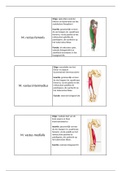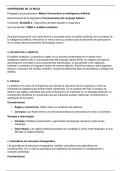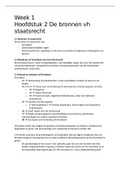Political rhetoric
Example – Question exam
- What explains, according to James Martin, why many political theorists see political
rhetoric as something dangerous? Illustrate by referring to one political theorist of
your choice (e.g. Plato, Rousseau,...).
- Speech Lady Gaga
1. Identify the parts of the speech (= ‘arrangement’).
2. Decide which type(s) of appeals (= ‘discovery’) predominate in each part of
the speech. Illustrate your decision with examples from the speech.
3. Based on your analysis of the arrangement and discovery, would you consider
the speech to be persuasive?
- Deliberative democracy is something criticized for “making unrealistic demands on
how participants should communicate.” Explain this criticism. According to you, does
it imply that the whole idea of deliberative democracy should be dismissed?
Class 1 – 2/10/2023
The importance of political rhetoric
- There is no politics without persuasion
o If you look at what happens in the government & parliament today, in the
international relation scene, it is often a matter of persuasion
Zelensky trying to persuade the US government to spent more
resources on the war
o Speech is crucial
- The reason: There is uncertainty in the world
- Persuasion by speech vs. persuasion by force
o There are different ways to persuade people: You can talk or persuade people
by rude force
Typical about rhetoric: you use speech & thereby the component of
free will is important.
When you are persuades by someone you somehow choose to be
persuaded, to submit yourself by the ideas of the other person. It’s not
about force, it’s a matter of accepting the message & believing what
that person says More powerful that persuading by force
Even in those totalitarian regimes, leaders defend their course of
action, they still give speeches to convince people also verbally of
what they’re doing. Because when you accept a massage it is more
powerful than when you are just forced to obey to a certain situation
, Persuasion is “a symbolic process in which communicators try
to convince other people to change their own attitudes or
behaviors regarding an issue through the transmission of a
message in an atmosphere of free choice”
” Democracy . . . is distinguished as a form of governance by
the extent of persuasion relative to coercion”
o The fundamental political skill?
In short, you could say in this context, in what politic is. That
persuasion is crucial.
What is rhetoric?
- Greek ‘retoriketekhne’
o Rhetor = speaker
o Tekhne = art
- Studying rhetoric
o Learning the practical skills of persuasion
o Studying the persuasiveness of speech
- Not limited to spoken word (oratory)
o Written word
o Visuals (the way how someone behaves,..)
Political rhetoric
- There are many areas of rhetorical studies, we dive deeper in the political part
- Persuasion in the political realm
- Not limited to politicians as political actors
o Example: A scientist during corona who was a lot on TV, in a way he is at that
moment a political actor as well
- “What makes a political speech persuasive (or not)?
WARM – UP: Speech – Martin Luther King
- “I have a dream”
- Activist leader of civil rights movement
- Is this speech persuasive?
o Credibility as a person
o Arousal of emotion
o Convincing arguments
o Use of rhetoric devices (repetitions, allusion, rhyme, …)
o How he speaks
A diverse research field?
,The field of political rhetoric is not a very well delineated field of research. In the sense that
it is a very diverse. People from different background are doing political rhetoric related
studies. Some people focus on the linguistics, some on the psychological component,…
- Different background, different questions
o Linguistics (ex. rhetoric figures)
o Psychology (ex. emotions vs. The cognitive)
o Political science (ex. Questions of power)
o Communication science (ex. mass media)
- Each with their own terminology & research methods
- Difficult: They don’t always talk to each other
- This course: Eclectic approach
Rhetoric, a contested notion
- Rhetoric itself is a little bit of a contested notion. It’s a word that has a certain
connotation
- Words often associated with rhetoric
o “mere”; “empty”
o Rhetoric is contrasted with reality
As if rhetoric is somehow opposed to things that are real, as it is
contrasted with reality
Example: Big companies have a rhetoric in which they pretend to be
concerned about the climate, but what they do is not in line with
these ideas
- Association with danger
o Can people be persuasive of anything (violence, misinformation)
o Example: attack on the Capitol and the role of Trump
o Example: Fake news
- At the same time: No democracy without free speech
o The basic of free speech, persuading each other, debate. It is a thing that is
indispensable and at the same time is looked at with suspicion. It had his
routs already in classical/ Ancient times
Rhetoric was central to ancient democracy
- Greece, 500 BC
- From aristocracy to democracy
o Demos = people
o Ekklesia = assembly
- Highly participatory system
o Status of being citizen comes with obligations
Being able to speech and speak well
Citizen: Women, slaves where not seen as citizens, so only the ‘better’
people were seen as a citizen
- In that time rhetorical skills were important
- There were teachers: sophists
, o Sophos = wisdom
The teachers who were wise in terms of rhetoric
o Example: Gorgias, Protagoras
- Culture of oral transmission
- Different views of classical thinkers
Plato
- The voice that represents the first site in our debate about whether rhetoric a good
thing is that we need or if it dangerous and empty?
- He is against rhetoric
Plato’s POV
- Rhetoric is empty and dangerous
o Can do bad instead of good
Has something to do with his mentor Socrates was sentenced to dead.
He was accused of doing bad to the youth.
o It can persuade most people of anything; a ‘rudderless boat’; “sophistries”
Convincing people of things that are not true
- Belief in one moral “truth”
o Allegory of the cave
o Only a small elite can see it
- “The Republic”
o Society should be based on reason
o Society that is led by philosopher kings, people who are able to see the real
truth and the others they should focus on trade or protecting the city
- Ideas were later criticized (e.g. Popper)
o Because you could label it as a totalitarian thinking – “only few people in this
country who can see the real truth, and who can lead us, the rest should
trade or protect”
- More sympathetic reading: argument for alternative type of rhetoric (dialectic)
o Cf. Technocracy today
Aristotle
- Student of Plato
- Same period, but he was younger
- He didn’t agree with Plato, he was more positive about political rhetoric
- Man is a ‘political animal’ &
o What distinguishes us from animals is that we are political animals. We can
communicate, decide together. Living the ‘good life’ is living in accordance
with community. We live in community not on our own, not just to survive bit
to create meaning (vs. Plato: natural state)
- He agreed with Plato that some things are true and can be facts, but even if that’s
the case it’s useful to reflect on how we can best argue for a case
- Rhetoric complements philosophical reasoning
Example – Question exam
- What explains, according to James Martin, why many political theorists see political
rhetoric as something dangerous? Illustrate by referring to one political theorist of
your choice (e.g. Plato, Rousseau,...).
- Speech Lady Gaga
1. Identify the parts of the speech (= ‘arrangement’).
2. Decide which type(s) of appeals (= ‘discovery’) predominate in each part of
the speech. Illustrate your decision with examples from the speech.
3. Based on your analysis of the arrangement and discovery, would you consider
the speech to be persuasive?
- Deliberative democracy is something criticized for “making unrealistic demands on
how participants should communicate.” Explain this criticism. According to you, does
it imply that the whole idea of deliberative democracy should be dismissed?
Class 1 – 2/10/2023
The importance of political rhetoric
- There is no politics without persuasion
o If you look at what happens in the government & parliament today, in the
international relation scene, it is often a matter of persuasion
Zelensky trying to persuade the US government to spent more
resources on the war
o Speech is crucial
- The reason: There is uncertainty in the world
- Persuasion by speech vs. persuasion by force
o There are different ways to persuade people: You can talk or persuade people
by rude force
Typical about rhetoric: you use speech & thereby the component of
free will is important.
When you are persuades by someone you somehow choose to be
persuaded, to submit yourself by the ideas of the other person. It’s not
about force, it’s a matter of accepting the message & believing what
that person says More powerful that persuading by force
Even in those totalitarian regimes, leaders defend their course of
action, they still give speeches to convince people also verbally of
what they’re doing. Because when you accept a massage it is more
powerful than when you are just forced to obey to a certain situation
, Persuasion is “a symbolic process in which communicators try
to convince other people to change their own attitudes or
behaviors regarding an issue through the transmission of a
message in an atmosphere of free choice”
” Democracy . . . is distinguished as a form of governance by
the extent of persuasion relative to coercion”
o The fundamental political skill?
In short, you could say in this context, in what politic is. That
persuasion is crucial.
What is rhetoric?
- Greek ‘retoriketekhne’
o Rhetor = speaker
o Tekhne = art
- Studying rhetoric
o Learning the practical skills of persuasion
o Studying the persuasiveness of speech
- Not limited to spoken word (oratory)
o Written word
o Visuals (the way how someone behaves,..)
Political rhetoric
- There are many areas of rhetorical studies, we dive deeper in the political part
- Persuasion in the political realm
- Not limited to politicians as political actors
o Example: A scientist during corona who was a lot on TV, in a way he is at that
moment a political actor as well
- “What makes a political speech persuasive (or not)?
WARM – UP: Speech – Martin Luther King
- “I have a dream”
- Activist leader of civil rights movement
- Is this speech persuasive?
o Credibility as a person
o Arousal of emotion
o Convincing arguments
o Use of rhetoric devices (repetitions, allusion, rhyme, …)
o How he speaks
A diverse research field?
,The field of political rhetoric is not a very well delineated field of research. In the sense that
it is a very diverse. People from different background are doing political rhetoric related
studies. Some people focus on the linguistics, some on the psychological component,…
- Different background, different questions
o Linguistics (ex. rhetoric figures)
o Psychology (ex. emotions vs. The cognitive)
o Political science (ex. Questions of power)
o Communication science (ex. mass media)
- Each with their own terminology & research methods
- Difficult: They don’t always talk to each other
- This course: Eclectic approach
Rhetoric, a contested notion
- Rhetoric itself is a little bit of a contested notion. It’s a word that has a certain
connotation
- Words often associated with rhetoric
o “mere”; “empty”
o Rhetoric is contrasted with reality
As if rhetoric is somehow opposed to things that are real, as it is
contrasted with reality
Example: Big companies have a rhetoric in which they pretend to be
concerned about the climate, but what they do is not in line with
these ideas
- Association with danger
o Can people be persuasive of anything (violence, misinformation)
o Example: attack on the Capitol and the role of Trump
o Example: Fake news
- At the same time: No democracy without free speech
o The basic of free speech, persuading each other, debate. It is a thing that is
indispensable and at the same time is looked at with suspicion. It had his
routs already in classical/ Ancient times
Rhetoric was central to ancient democracy
- Greece, 500 BC
- From aristocracy to democracy
o Demos = people
o Ekklesia = assembly
- Highly participatory system
o Status of being citizen comes with obligations
Being able to speech and speak well
Citizen: Women, slaves where not seen as citizens, so only the ‘better’
people were seen as a citizen
- In that time rhetorical skills were important
- There were teachers: sophists
, o Sophos = wisdom
The teachers who were wise in terms of rhetoric
o Example: Gorgias, Protagoras
- Culture of oral transmission
- Different views of classical thinkers
Plato
- The voice that represents the first site in our debate about whether rhetoric a good
thing is that we need or if it dangerous and empty?
- He is against rhetoric
Plato’s POV
- Rhetoric is empty and dangerous
o Can do bad instead of good
Has something to do with his mentor Socrates was sentenced to dead.
He was accused of doing bad to the youth.
o It can persuade most people of anything; a ‘rudderless boat’; “sophistries”
Convincing people of things that are not true
- Belief in one moral “truth”
o Allegory of the cave
o Only a small elite can see it
- “The Republic”
o Society should be based on reason
o Society that is led by philosopher kings, people who are able to see the real
truth and the others they should focus on trade or protecting the city
- Ideas were later criticized (e.g. Popper)
o Because you could label it as a totalitarian thinking – “only few people in this
country who can see the real truth, and who can lead us, the rest should
trade or protect”
- More sympathetic reading: argument for alternative type of rhetoric (dialectic)
o Cf. Technocracy today
Aristotle
- Student of Plato
- Same period, but he was younger
- He didn’t agree with Plato, he was more positive about political rhetoric
- Man is a ‘political animal’ &
o What distinguishes us from animals is that we are political animals. We can
communicate, decide together. Living the ‘good life’ is living in accordance
with community. We live in community not on our own, not just to survive bit
to create meaning (vs. Plato: natural state)
- He agreed with Plato that some things are true and can be facts, but even if that’s
the case it’s useful to reflect on how we can best argue for a case
- Rhetoric complements philosophical reasoning







